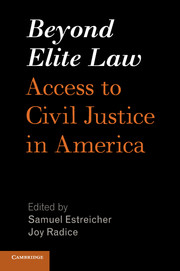Book contents
- Frontmatter
- Contents
- Beyond Elite Law
- Foreword
- List of Contributors
- Overview
- Overview
- PART I CURRENT STATE OF ACCESS TO LEGAL SERVICES
- 1 Access to Civil Justice in America: What Do We Know?
- 2 Life in the Law-Thick World: Legal Resources for Ordinary Americans
- 3 The Need for a National Civil Justice Survey of Incidence and Claiming Behavior
- 4 When Does Representation Matter?
- 5 Self-Representation and the Dismissal of Chapter 7 Bankruptcy Cases
- 6 Racial Disparities in Legal Representation for Employment Discrimination Plaintiffs
- 7 The Unemployment Action Center: A Student-Driven Response to a Legal Need
- 8 Immigrant Representation: Meeting an Urgent Need
- 9 Self-Representation, Civil Gideon, and Community Mobilization in Immigration Cases
- PART II SOURCES OF LEGAL SERVICES ASSISTANCE FOR WORKING AMERICANS
- PART III FASHIONING A REFORM AGENDA
- PART IV CREATING A CULTURE OF SERVICE
- Index
7 - The Unemployment Action Center: A Student-Driven Response to a Legal Need
from PART I - CURRENT STATE OF ACCESS TO LEGAL SERVICES
Published online by Cambridge University Press: 05 May 2016
- Frontmatter
- Contents
- Beyond Elite Law
- Foreword
- List of Contributors
- Overview
- Overview
- PART I CURRENT STATE OF ACCESS TO LEGAL SERVICES
- 1 Access to Civil Justice in America: What Do We Know?
- 2 Life in the Law-Thick World: Legal Resources for Ordinary Americans
- 3 The Need for a National Civil Justice Survey of Incidence and Claiming Behavior
- 4 When Does Representation Matter?
- 5 Self-Representation and the Dismissal of Chapter 7 Bankruptcy Cases
- 6 Racial Disparities in Legal Representation for Employment Discrimination Plaintiffs
- 7 The Unemployment Action Center: A Student-Driven Response to a Legal Need
- 8 Immigrant Representation: Meeting an Urgent Need
- 9 Self-Representation, Civil Gideon, and Community Mobilization in Immigration Cases
- PART II SOURCES OF LEGAL SERVICES ASSISTANCE FOR WORKING AMERICANS
- PART III FASHIONING A REFORM AGENDA
- PART IV CREATING A CULTURE OF SERVICE
- Index
Summary
In New York unemployment insurance hearings, the vast majority of claimants represent themselves when they appeal the denial of their claim. There are virtually no lawyers for these claimants. In New York City, students from several law schools, with nominal support from their institutions, have maintained since 1981 a legal aid office, the Unemployment Action Center, to address the need for representation. This chapter by NYU graduate David Yin offers an example of how law students can make a difference in administrative forums, like public housing hearings, welfare hearings, licensing hearings, and truancy hearings, where most litigants represent themselves and a license to practice law is not required to provide trained assistance.
America's system of unemployment insurance (UI) was created in the midst of the Great Depression as a primary component of the Social Security Act of 1935. The unemployment benefit, a cash payment disbursed to unemployed individuals, fulfills a dual role of providing individuals with temporary support when they lose their jobs, and sustaining consumer spending to stimulate local economies. The UI system is a prophylaxis against and a treatment for economic recessions. The system is funded by a federal payroll tax on employers, against which a partial credit may be claimed if the employer paid into a state-administered unemployment insurance fund. This mode of funding has encouraged all states to enact and administer their own UI programs. Today, all 50 states, the District of Columbia, Puerto Rico, and the Virgin Islands have UI regimes for their workers, administered under state-set eligibility criteria and benefit levels. Federal law, however, prescribes the minimum standards that states must meet to have their programs certified for federal funding.
In New York, UI benefits are available to a worker who is “totally unemployed”: receiving no income for services for a given workweek and unable to engage in the usual employment for which the worker is reasonably fitted by training or education. The worker must have achieved certain monetary eligibility by receiving income during a “base period” prior to becoming unemployed. The worker must also be able to work, be available to work, and be actively seeking work. Additionally, a UI claimant may be disqualified from receiving benefits if the claimant left the prior position voluntarily without good cause, or if the involuntary unemployment was caused by the worker's misconduct in the prior position or criminal activity.
- Type
- Chapter
- Information
- Beyond Elite LawAccess to Civil Justice in America, pp. 123 - 134Publisher: Cambridge University PressPrint publication year: 2016



